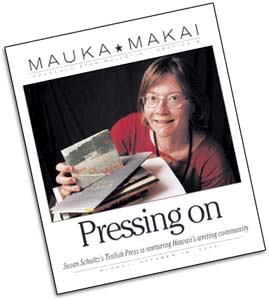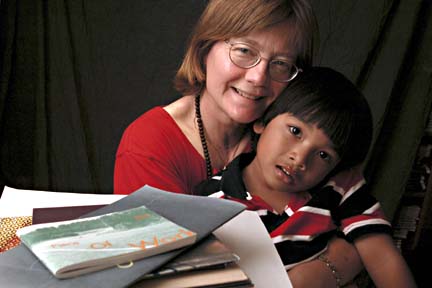
[ MAUKA MAKAI ]
CRAIG T. KOJIMA / CKOJIMA@STARBULLETIN.COM
Local Tinfish Press publisher Susan Schultz, with some of her imaginatively designed books.
Small press,
big ideasTinfish Press specializes
in publishing writings of
Pacific-based authors and poets
SUSAN SCHULTZ is a subversive -- of the English language. As the publisher of the small and feisty Tinfish Press, she juxtaposes local, sometimes pidgin, writing with the experimental prose and poetry she accepts from the rest of the Pacific area.
"Whether it's pidgin or stretching the limits of language in other ways," she said, "I like putting them together and having people seeing them both on the printed page."
Tinfish reading
Where: Native Books, Ward WarehouseWhen: 6 p.m. Nov. 7
Admission: Free
Information: Email sschultz@hawaii.edu
Note: Tinfish Press books are available at the University of Hawaii at Manoa bookstore and Native Books. They're also available online at http://maven.english.hawaii.edu/
tinfish. Lee Tonouchi's "Living Pidgin" book is also available at Borders and Barnes & Noble bookstores.
And sometimes both kinds of writing can be combined by the same writer in one piece. Two of Tinfish Press' best sellers are "Sista Tongue" by Lisa Linn Kanae and "Living Pidgin: Contemplations on Pidgin Culture" by "Da Pidgin Guerilla" himself, Lee Tonouchi. "Living Pidgin" contains an essay on the "Pidgin Revolution," a series of transcribed talks Tonouchi has given over the past four years and some provocative concrete poetry, i.e. "Test Your Pidgin P.O.V." -- "NO CAN."
Kanae's prose alternates between a pidgin-filled memoir of the speech problems her brother Harold-Boy had when he was young, with an academic essay on the history of Hawaii's unique Creole dialect, in light of ethnicity and economic class.
To match the alternative content of its pages, the chapbook is then wrapped up in an imaginative layout by University of Hawaii at Manoa graphic design student Kristin Kaleinani Gonzales. Her cover boldly mixes font sizes, text placement and black-and-white photos of mouths captured in various shapes of speech.
Gonzales is just one of several students art director and UH art faculty member Gaye Chan has recruited to give Tinfish Press a distinctive small press look.
Part of the chapbooks' lively look can also be attributed to the occasional use of recycled material Schultz and Chan use whenever they can.
"We used recycled roofing material for the cover of our latest journal issue of Tinfish. A whole bunch of unused hamburger sleeves inspired us to get Steve Carll, a poet and avowed vegetarian, to do a chapbook on the very subject that would fit neatly into the sleeves," said Schultz.
Earlier issues of the Tinfish poetry journal included covers made from old cereal boxes that were found in a trash bin, flattened and neatly tied together, and cover proofs of tourist brochures, each branded with the issue number.
CRAIG T. KOJIMA / CKOJIMA@STARBULLETIN.COM
The designers of those books are, from top, Kristin Kaleinani Gonzales, Stuart Henley and Ryan Higa.
"All of the designers are from UH," Schultz said. "There's no pay involved, but we pretty much give them free reign to do whatever they want.
"The whole idea of doing a small press is to keep it manageable," she said, even though they've graduated from the days of Xeroxing and hand stapling pages. "We want this to stay simple, albeit with some wonderful design work.
"It was important that we emphasize accessibility, rather than gloss, and the poets emphasize language, as well as content."
IT'S BEEN an interesting journey for Schultz, who left a teaching position at William & Mary in Williamsburg, Va., in 1990 for a job as an assistant professor in English at UH. Now a full professor, Schultz was inspired to become a small press publisher because of mailings she received 13 years ago.
"I started finding out about small press work when I would get these little chapbooks through the mail," she said, "and I thought, 'What a wonderful thing to make to help create a community of writers.'"
In 1995, she financed the first issue of Tinfish, subtitled "a journal of experimental poetry from the Pacific."
"I always had it in mind to emphasize just the inclusion of poets from the West Coast, here, Australia and Asia."
The name Tinfish was inspired by a friend who initially suggested "Goldfish." "But I wanted a word that would combine the natural with the contrived, so, working off his idea, I came up with Tinfish."
Some of Tinfish Press' earlier work has already gone out of print. "Ola" by pidgin poet Joe Balaz has long gone through its original 100-copy run. Kathy Bonggo's popular chapbook of Wahiawa-based poetry "4 Evas" went through three print runs before it ended at 1,000 copies.
"It was an important little book," Schultz said. "A lot of local writers said they were influenced by it."
She also financed the reprinting of "Sista Tongue" three times. But Schultz obviously cannot constantly do multiple print runs on popular titles because of the expense involved. Besides, she says that "one of the operating principles of doing a small press is that you don't print constantly, on a regular schedule.
"There's also no payment to the authors -- they get paid in copies of their books. But I admit that I feel guilty about that. With the case of Lisa and her 'Sista Tongue,' I took her out for dinner and have sent her copies of everything we've published since then."
CRAIG T. KOJIMA / CKOJIMA@STARBULLETIN.COM
Steve Carll's poetry chapbook, "Hamburger," comes packaged in an actual burger foil bag.
SCHULTZ IS WORKING toward getting Tinfish Press nonprofit status, while continuing to publish material that, even without the immediate appeal of a "Sista Tongue" or a "Living Pidgin," she feels is important enough to see the light of day.
"We have a new chapbook by Vietnamese poet Lihn Dinh titled 'All Around What Empties Out' that is doing pretty well sales-wise. He earlier did the translations for our 'Three Vietnamese Poets' book that, I thought, started off criminally as an underseller, because we printed the translations without the originals. That was because it just ended up being too difficult to do -- our designer didn't know Vietnamese and didn't have the fonts available to print it in the language."
Another favorite chapbook of Schultz's is "Alchemies of Distance," with poetry by Caroline Sinavaiana-Gabbard, and an introductory essay of her life as a Tibetan Buddhist from an American Samoan family living in Florida.
"We also put out several weeks ago 'Carved Water' by Zhang Er. She's a poet born in Beijing who now lives in Washington state. She writes in Chinese, then translates it into basic English. She then seeks out collaborators to help make her translations sound more poetic, and, this time out, Bob Holman, who's well-known in national poetry-slam circles, helped her."
PATIENCE IS not only a virtue, but a necessity when it comes to running a small press. But it's also been a rewarding experience for Schultz.
"I want to let people know how exciting Hawaii writing is, as well as bring in outside writing. I think we're really achieving that with Tinfish Press. I admit it's hard at times, partly due to the problem of distribution. But, when it comes to the increased number of submissions I've received, I feel freer to choose what I think is best for the press.
"At first, I was tentative, but, as more books came out and feeling more confident in seeing how it was working, it's become more fun and the possibilities seem larger."
And if the small press does become a nonprofit organization, Schultz hopes that, with a little more money to play with, she and Chan will get more help with distribution and publicity, plus use higher quality paper and printers without sacrificing the press' artistic vision.
"The other year, I spent four- to five-thousand dollars of my own money," she said, "and the money that does come back is all earmarked for Tinfish."
And don't think Schultz has forgotten about herself as a poet. One of the projects on tap is "a little book of my own titled 'No Guns, No Durian,' about the Cambodian boy my husband and I adopted.
"I pulled that title from a quote from one of Angelina Jolie's online journals as a United Nations representative. She has an adopted Cambodian child as well."
CRAIG T. KOJIMA / CKOJIMA@STARBULLETIN.COM
Susan Schultz and her four-year-old son, Sangha.
Schultz has done two previous books about her experiences in adopting Sangha, now 4, an active little boy who seems to eat his weight in food every day.
"The newer book of prose poems will deal with the way people talk about adopted families. For some reason, it seems no one is socialized to deal with this, and it sometimes borders on incomprehension."
Still, Schultz and her family feel comfortable in her adopted island home.
"I've found that Hawaii writers are very idealistic," she said. "They feel their work matters here, especially if it says something about the relationships between groups of people, or issues like Hawaiian sovereignty. It's good that they feel responsible to the community, compared to the writers I knew back in Virginia. I find that fascinating as both a writer and an editor.
"While there may be tensions between some of the local writers, I think it's ultimately good, so long as it moves to more creative places."
BACK TO TOP |
A sampling
The following works are reprinted with permission from Tinfish Press:
dark side of street
yearns for sunlight
water gifts the soil
woman's fleshy arm
calls to dog here
dog black stripe
brightens up water
brightens arm sparkles
like silver the dark
street a narrow lane
dissolving into water-- From "Carved Water,"
translated from Chinese
by Bob Holman
My Grandma axes my friends
wit Okinawan last names.
I dunno why,
she always gets
disappointed
when dey tell
Palolo.-- From Tinfish 13
Perspective of the firing hand.
In bed with the military.
Beaming their daily ration. Advance with the story.
The night-goggles filter more. Ring around the rosy,
a pocketful of cozy. Say what we say we do,
a casual ration of 1 to 100 to 1000.
If the 1 remains 1, the others can
grow to infinity.
Baghdad spring
laserguided clusterfoodbomb
the out-living heartminds
Camp David vs. Camp X-Ray.
The hardball game of the century.
Flights have stopped. Sick, will throw up.
A pretzel for peace. Rallies for clear channel,
as billions are passed off as focus group.
Lower Wilhemina
helicopters chop
the spring silence up.-- From Tinfish 13
Click for online
calendars and events.






